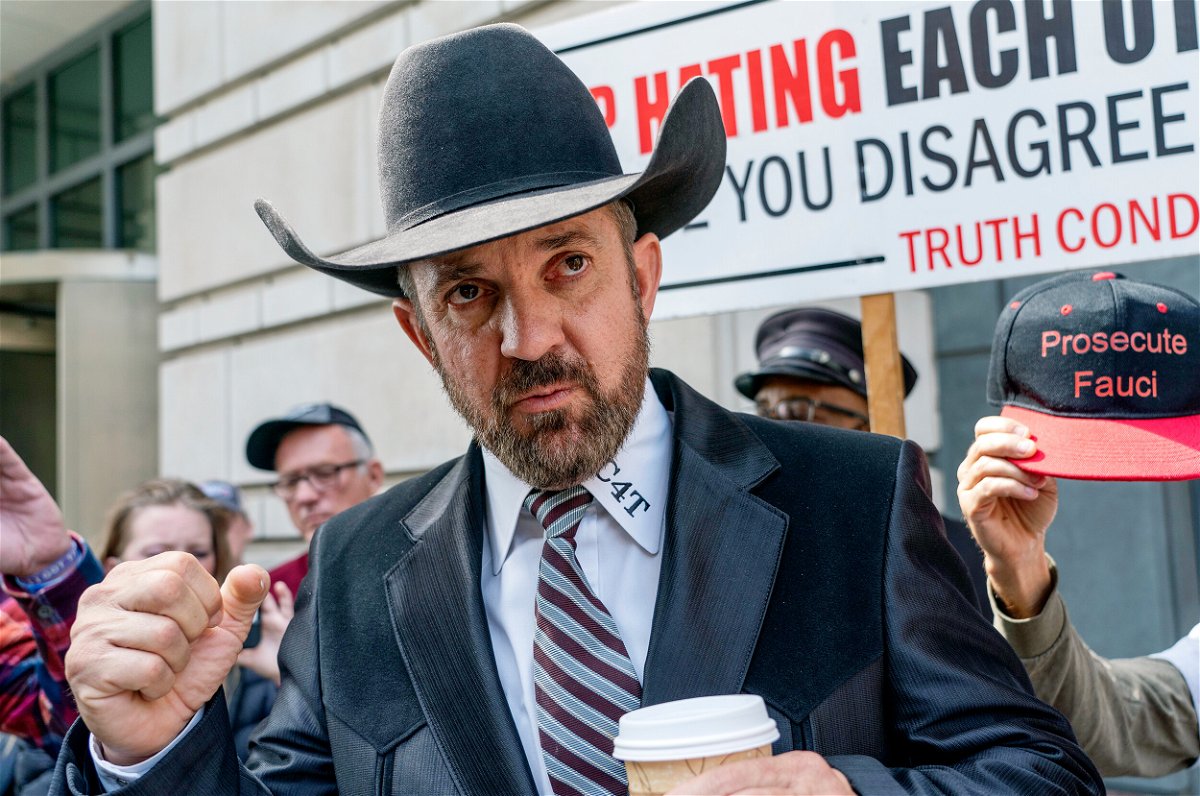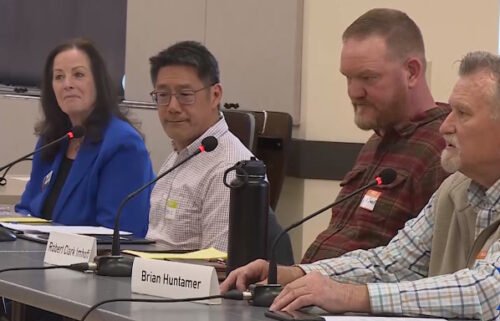Federal judge won’t shut down case seeking to remove New Mexico county official from office over January 6 conviction

Otero County Commissioner Couy Griffin stands outside the federal court on March 22
By Marshall Cohen, CNN
A federal judge on Tuesday rejected an attempt by a New Mexico county commissioner to shut down state proceedings against him that seek to remove him from office because of his conviction for trespassing on US Capitol grounds on January 6, 2021.
Couy Griffin, an Otero County commissioner and a prominent right-wing conspiracy theorist who was part of the Capitol insurrection mob, returned to national attention earlier this month by refusing to certify the results of recent primary elections in his county, citing baseless claims of election irregularities, which triggered a standoff with state election authorities.
The liberal-leaning watchdog group Citizens for Responsibility and Ethics in Washington, also known as CREW, says Griffin should be removed from office and banned from running again because of the US Constitution’s “disqualification clause,” which says any officeholder who later supports an insurrection is no longer eligible to serve. Like-minded activist groups have relied on this same provision to pursue unsuccessful challenges against other Republican officials, including Reps. Marjorie Taylor Greene of Georgia and Madison Cawthorn of North Carolina.
The group initiated the disqualification proceedings against Griffin in March, and the state judge overseeing those proceedings scheduled Griffin’s disqualification trial for August.
Legal experts have closely followed such lawsuits because they are a precursor for the unprecedented candidacy challenges that former President Donald Trump will surely face if he runs in 2024. The head of the legal advocacy group that targeted Greene and Cawthorn said this week that he’ll challenge Trump’s candidacy “soon after he files to appear on a state ballot.”
Testing Trump’s possible defenses
The statutes and constitutional provisions at stake date back to the Civil War era, so these cases are setting important new precedents. The liberal groups haven’t removed anyone from the ballot, but they have secured some key rulings that chip away at Trump’s possible defenses.
Griffin, Greene and Cawthorn all claimed that an 1872 amnesty law shielded them from being disqualified because it applied to any past and future insurrections. Two federal district judges disagreed. A third federal judge agreed, but his ruling was overturned by an appeals court, creating binding precedent in five states, including the battleground state of North Carolina.
Federal Judge Kenneth Gonzales, who handled Griffin’s lawsuit in New Mexico, ruled last week against the Amnesty Act defense and said he backed the interpretation from the appeals court.
He rejected the rest of Griffin’s arguments Tuesday. He dismissed Griffin’s lawsuit, which said the CREW challengers were violating his rights, and thus, their state case should be shut down.
“While the outcome of that case is far from a foregone conclusion, Griffin relies on the further logical leap that loss in state court is tantamount to a constitutional violation. The Court is not persuaded,” he wrote. “(The disqualification clause) narrows the First Amendment right to run for office and will require an analysis based on the substance and facts of the state action.”
Ongoing danger from election deniers
The Griffin case is unique because he is the only person to face this type of constitutional challenge who was actually convicted of a crime related to January 6. The activists who sued Greene and Cawthorn struggled to directly connect them to the violence at the Capitol that day.
And his case has taken on new urgency after the uproar he caused in conservative-leaning Otero County, where he and other GOP officials initially refused to certify the results of a recent primary election, citing potential issues with election machines, even though none of the candidates on the ballot claimed that there was fraud, or even filed any lawsuits seeking to block certification.
The standoff led New Mexico Secretary of State Maggie Toulouse Oliver, a Democrat, to ask the New Mexico Supreme Court to intervene and to force the county commissioners to certify the results. Hours before a legal deadline, the Otero County Commission voted 2-1 to certify the results, with Griffin voting no. He said he had a “gut feeling and intuition” to oppose the move.
Trump critics from across the political spectrum have said the episode highlights the ongoing threat posed to US democracy by election deniers who still believe Trump won in 2020, and conspiracy theorists who have embraced his lies about widespread vote-rigging. In that vein, CREW said in a statement Tuesday that it is eager for the disqualification trial against Griffin.
“We are pleased with Judge Gonzales’ decision to dismiss Commissioner Griffin’s retaliatory lawsuit against our clients, and later this summer we plan to present our clients’ case against him for disqualification and removal,” CREW chief counsel Donald Sherman said in a statement.
The-CNN-Wire
™ & © 2022 Cable News Network, Inc., a WarnerMedia Company. All rights reserved.



